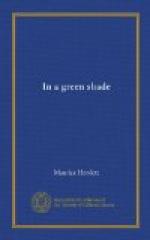[Footnote A: He is here following Edward FitzGerald.]
Every bad ballad has its archetype in a good one, and all ballads of whatsoever quality, can be pigeonholed under subjects, whether of content or of treatment. My first specimen from Kent could be classified as the Ballad Encomiastic, or, at will, as the Ballad of Plain Statement, in which latter case it would be considered as a ballad proper and derive itself passim from Professor Child’s book. In the former case you would have to go back to Homer for its original. It calls itself “An Epitaphe”—which it could not be—“uppon the death of the noble and famous Sir Thomas Scott of Scottshall, who dyed the 30 Dec. 1594,” and begins thus:
Here lyes Sir Thomas Scott by name—
O happie Kempe that bore him!
Kempe is his mother.
Sir Reynold with four knights of fame
Lyv’d lynealy before him.
The poet chooses to treat of ladies by their surnames, for we go on:
His wieves were Baker, Heyman, Beere,
His love to them unfayned;
He lived nyne and fiftie yeare.
And seventeen soules he gayned.
Seventeen children, in fact—but
His first wief bore them every one,
The world might not have myst her—
A very obscure line, at first blush rather hard on Baker, and flatly contradicted by what follows:
She was a very paragone,
The Lady Buckhurst’s syster.
Nothing could be more succinct. Now for Beere:
His widow lives in sober sort,
No matron more discreeter;
She still reteines a good report,
And is a great housekeeper.
Apart from his valiancy as a consort Sir Thomas seems to have done little in the world but be rich in it. The best that can be said of him by the epigraphist is contained in what follows:
He made his porter shut his gate
To sycophants and briebors,
And ope it wide to great estates,
And also to his neighbours.
That does not recommend Sir Thomas to me. I suspect himself of sycophancy, if not of briebory, and it may well be that he shut out others of his kidney in order that he might have free play with the great estates. But that is not the poet’s fault, who had to say what he could.




